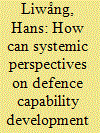| Srl | Item |
| 1 |
ID:
192605


|
|
|
|
|
| Summary/Abstract |
Over the last thirty years, suggestions for how to develop defence capability have developed rapidly. However, supporting theory and structured concept development lag behind. Despite this imbalance, countries need to continuously spend resources on defence development. This study identifies central challenges in relation to the scientific perspectives and approaches needed to support the development of defence capability. The results show that the support for developing interactions between technology and social components is especially weak and that relevant supporting theories and methods from related fields are not considered. This study also shows that it is important to be able to address these questions from various perspectives and not to be limited by a specific scientific tradition. Finally, this study also identifies a possible emerging cluster of reports on capability-related research that provide a base for a much-needed cross-disciplinary approach to the development of defence capability.
|
|
|
|
|
|
|
|
|
|
|
|
|
|
|
|
| 2 |
ID:
178845


|
|
|
|
|
| Summary/Abstract |
This article examines policy approaches impacting the adoption of alternative energy technology. Researchers investigated the factors affecting the transition to automated wood pellet heating (AWPH) in northeastern US as an example of the early stages of an energy transition in small-scale heating. The research team applied diffusion of innovation theory and the multi-level perspective on sociotechnical transitions to develop a system-wide analysis of the AWPH transition, incorporating multiple actor groups and policy strategies. Sixty interviews were conducted across four northeastern states with adopters and informed non-adopters of AWPH, and with industry, policy, and community representatives. Using interview results and theory, surveys were developed and distributed state-wide to both adopters and non-adopters with 690 useable responses (38% response rate). Qualitative and quantitative data analysis found differences in the factors impacting AWPH adoption between those within the Model Neighborhood Project (MNP), a privately-run program aimed at accelerating the diffusion of AWPH, and those who had access to state-run programs alone. These differences and the success of the MNP suggest that policy aimed at supporting early-stage energy transitions should incorporate not only consumer financial incentives, but also build a local network of supply-side actors through community-based outreach and technical support.
|
|
|
|
|
|
|
|
|
|
|
|
|
|
|
|